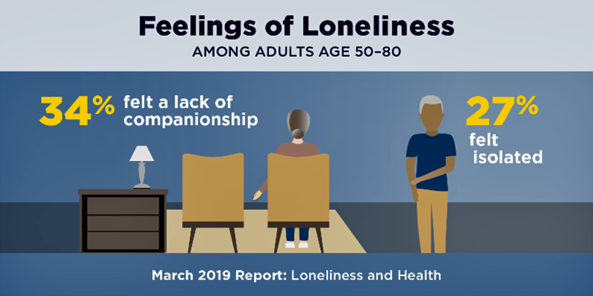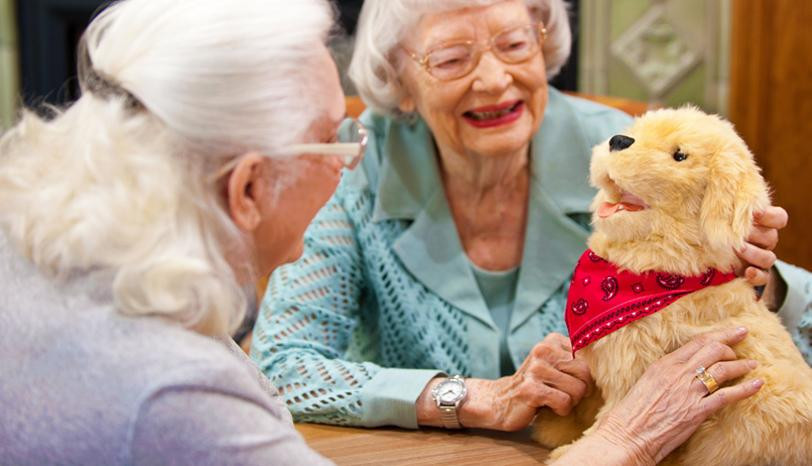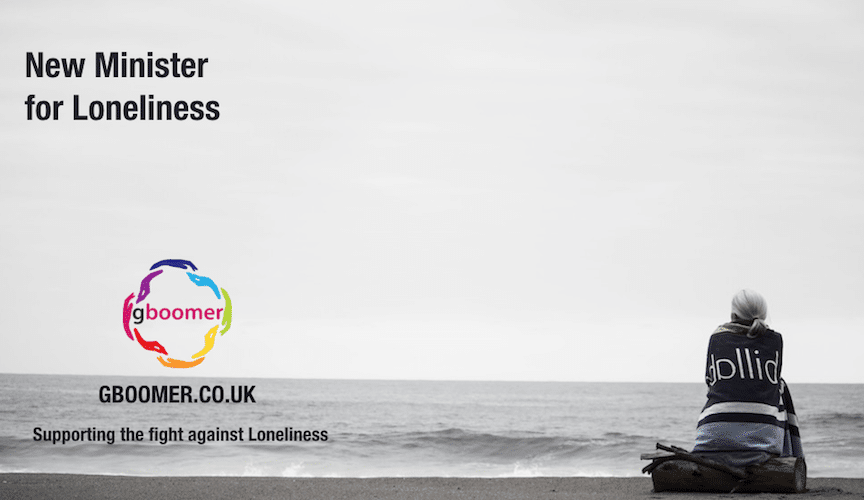 In America, one in three people over 50 years of age feels a lack of companionship, and one-fourth feel isolated from other people, according to a new poll on loneliness and aging from the University of Michigan, sponsored by AARP.
In America, one in three people over 50 years of age feels a lack of companionship, and one-fourth feel isolated from other people, according to a new poll on loneliness and aging from the University of Michigan, sponsored by AARP.
The University of Michigan National Poll on Healthy Aging surveyed some 2,000 U.S. adults age 50–80 in October 2018, assessing older peoples’ health, health behaviors, experiences and feelings related to companionship and social isolation.
While three in four people have frequent social contact with family, friends and neighbors outside of their home, the remaining one in four have social contact once a week or less.
Those at greatest risk are women compared with men, people with lower incomes under $60,000 a year, and those living alone. Interestingly, more people between 50 and 64 reported feeling isolated compared with people 65 to 80 years of age.
People who feel lonely also were more likely to say they were in poor or fair health versus people who rarely feel isolated.
It then follows that older people with good health habits less likely said they felt isolated or lacked companionship. Those good health habits included eating a healthy diet, getting exercise, and more frequently enjoying sufficient sleep.
In addition, those people who lack companionship are also more likely to say their hearing was poor or fair.
Health Populi’s Hot Points: Chronic loneliness is associated with memory loss, physical deterioration, eroding mental health, and lower life expectancy, the U-M point out. Loneliness is also part of an un-virtuous cycle that can magnify these health risks.
 How to mitigate loneliness, especially among older people? A recent meta-analysis looking at interventions to reduce social isolation and loneliness among older people looked at 38 studies through January 2016 and found some promising interventions, albeit lacking as robust a field as the researchers would have liked to mine. The key categories of interventions to address loneliness and isolation included:
How to mitigate loneliness, especially among older people? A recent meta-analysis looking at interventions to reduce social isolation and loneliness among older people looked at 38 studies through January 2016 and found some promising interventions, albeit lacking as robust a field as the researchers would have liked to mine. The key categories of interventions to address loneliness and isolation included:
- Social facilitation with peers or others who may be lonely, such as group-based activities, day care centres, and technology-based solutions like videoconferencing and social networking
- Psychological therapies, like stress reduction and mindfulness, reminiscence group therapy, and cognitive support
- Health and social care provision, e.g. enrolling in formal programs of care in either residential or community settings
- Animal interventions, particularly with dogs and cats — even robotic pets, like those used by the senior community, the Knolls in Oxford, Ohio. These furry electronic pets were demonstrated at HIMSS19 by Ted Fischer of Ageless Innovation (one example is shown here with two adoring and interacting human friends)
- Befriending interventions, social facilitation to nurture new friendships
- Leisure/skill development, from gardening and computer use to sports and holiday planning and sharing.
Another emerging solution might come from voice technology. One study described by the AARP (sponsor of the U-M research) discussed the potential for voice assistants like Alexa to address social isolation among older people. The AARP Foundation has invested in a Social Connectedness Voice-Activated Technology program to learn how Alexa, and her “sister” voice assistant technologies, could overcome some older folks’ resistance to the technology to support peoples’ community activities, access to the news, play favorite music and audiobooks, and remind patients to take their meds on-time.
 In the UK, Prime Minister Theresa May has appointed a Minister of Loneliness, Tracey Crouch, to call attention to and address the epidemic in Great Britain — what Minister Crouch has called, “the sad reality of modern life.” I wrote in detail about the importance of this appointment last year here in Health Populi.
In the UK, Prime Minister Theresa May has appointed a Minister of Loneliness, Tracey Crouch, to call attention to and address the epidemic in Great Britain — what Minister Crouch has called, “the sad reality of modern life.” I wrote in detail about the importance of this appointment last year here in Health Populi.
The challenge of loneliness and social isolation is universal, crossing age groups and gender. What is also universal is that loneliness can kill and hurt us. It’s a key social determinant of health, especially as Minister Crouch calls out as a sad reality of our modern life.
Dealing with this problem can certainly be helped by public policy, as Britain is explicitly trying to do. This can (must) also involve each of us N’s of 1’s in our communities. Let’s #BeKind to each other, just for a start.
The post Loneliness Is A Health Risk, Especially Among Older People appeared first on HealthPopuli.com.
Loneliness Is A Health Risk, Especially Among Older People posted first on http://dentistfortworth.blogspot.com
No comments:
Post a Comment